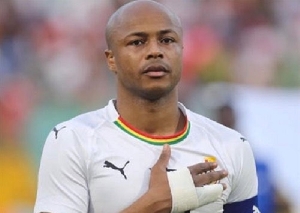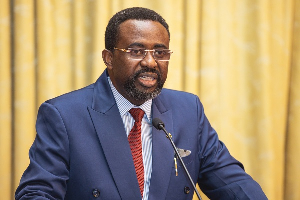Fallout From Woyome Case
The payment of judgement debt to Alfred Woyome by the State can never be appreciated without first delving into the genesis of the case.
The bone of contention presently is why payment of judgment debt.
Judgement debts arise when government at a particular time unfairly and unjustifiably terminates or abrogates legitimate contracts with individuals or institutions and an action is brought against the government by the aggrieved party through the courts to seek redress.
Redress in court results in payment of judgment debt if the plaintiff has a case and the court action is successful.
In the Alfred Woyome case, government recognises the unfair treatment meted out to his company by the Kufuor-led New Patriotic Party (NPP) administration and realized that the case is a bad one hence opting for prudent out of court settlement to save the nation millions of cedis.
Ex-President Kufuor, greedily took a unilateral decision to truncate and subvert a constitutional body that carried the procurement for the award of the stadia contract for CAN 2008.
This selfish and covetous act of former President Kufuor resulted in the payment of an avoidable GH¢42 million of the tax payers’ money in judgement debt to Alfred Woyome.
The loss of this money to the state in a form of judgement debt payment is a clear case of causing financial loss to the state and Mr. Kufuor should be answering questions for his narcissistic behaviour when he circumvented procedure to abrogate the Stadium contracts with winners of the tender for the projects.
There is evidence of people having caused massive financial loss to the state, more than what Mr. Abodakpi and Victor Salomey were said to have caused the state but they are freely roaming the streets of Accra and even have the temerity to question government’s efforts to clear the mess they created.
Did Kufuor’s action of abrogating the contract with Woyome’s company caused financial loss or not? If it has, why is nobody insisting the former President be questioned and prosecuted for his callous act which is causing the state so much money?
The NPP propaganda machinery quickly attempted to misinform Ghanaians by first claiming Woyome’s political affiliation was the main consideration for the payment of the huge sum of money.
After losing the argument on this assertion, and fearing Ghanaians would demand justice for the mess caused by ex-President Kufuor, NPP stalwarts started to shift the post by arguing that government has no contract with Woyome. However, discerning Ghanaians now understand the merits of the case thereby exposing the hypocrisy of NPP communicators who are trying to accuse government of taking a bad decision. To enable Ghanaians make informed decision about this case, there are two fundamental questions to be addressed. i) Whether there was a Contract between Government & Alfred Woyome (ii) Whether or not Government terminated the Contract
There was no contract between GOG and Woyome but there was a contract between GOG and the Woyome-led consortim comprising M-Powapak, Vamed Engineering and Waterville. Woyome was and still is a Director of M-Powapak, which is the local representative of Vamed. Mr. Woyome was very instrumental in the technical and financial engineering aspects of the tendering process. He made the presentation before the Evaluation Committee on the financial aspects of the consortium’s bid. He entered into an arrangement with Austro-Invest for the syndication of loans from Austrian banks for the project. He and Austro-Invest again entered into an agreement by which he would pay Austro-Invest 1% of whatever compensation is obtained from GOG. His involvement is admitted in the correspondences we had with the project consultants, BIC Limited, Waterville, Mr. Rex Danquah, the COO of the LOC and the Ministry of Finance.
This consortium had participated in the international bidding process for the construction of the stadia, hospitals and other facilities in 2005 and their bid was adjudged the best by the Evaluation Team from the Bank of Ghana and the Ministry of Finance. On 5th August 2005, the Central Tender Review Board gave its concurrent approval in terms of section 65(1) of the Public Procurement Act by giving notice to the consortium of the success of its tender. This in effect creates a contractual relationship between the bidder and GOG.
Subsequent to this approval, Mr. Woyome wrote to the then Minister for Education and Sports on 15th August 2005 (a week before the wrongful termination) informing him that the consortium had brought in experts and they were ready to start work on the rehabilitation of the stadia. It is interesting to note that in a Cabinet Memo, the Minister informed Cabinet of the difficulty of bringing in the Chinese after the procurement process had almost been completed.
Section 65(4) of Act 663 also provides that between the time that the notice is despatched to the contractor and the entry into force of the procurement contract, neither the procurement entity nor the contractor shall take any action that interferes with the entry into force of the procurement contract or its performance. On 22nd August 2005, soon after the notice had been given, the Minister for Education and Sports purported to terminate the procurement process, in effect terminating the contract between GOG and the Woyome-led consortium. What is even significant about this termination is that the Minister for Education and Sports did not have the power under the Act to terminate the process.
[NB - Section 65(2) requires that a written procurement contract is signed conforming to the tender is signed within 30 days of the notice. However, section 65(5) makes an exception for the accepted tender to enter into force when the notice is despatched to the supplier or contractor that submitted the tender].
(i) Whether or not funding was secured on behalf of GOG (ii) What was the amount of the funding
Funding was secured by the Woyome-led consortium on behalf of GOG. Woyome made a presentation on behalf of the consortium before the Evaluation Committee spelling out the details of the funding proposals.
The consortium secured a total of €1.1 billion with a grant element of 36.97%. This was made up of the following:
•Sports Stadia and facilities €764,117,646.00 •Hospitals and Wellness Centre €329,411,765.00 •GAEC, Cobalt 60 Irradiation Plant & € 12,941,176.00 Tissue Culture facilities Total €1,106,470,587.00
(i) Total Claim made by Waterville/Woyome (ii) Amount paid to Woyome/Waterville
This is in two parts: Waterville’s claim which is for actual work done plus damages for loss of profits and interest payments on loans, etc. and Woyome’s claim which was for financial engineering.
Woyome’ claim goes back to 2005 when the consortium put up a financial package that was to bring in a total of over €1.1 billion. This process was, however, truncated wrongfully when the Minister for Education and Sports terminated the procurement process. Woyome’s claim was for 4% of the total contract sum of €1.1 billion but this was negotiated down to 2% of the contract sum following advice from the Project Consultants, Rex Danquah and the Ministry of Finance.
Waterville’s claim was for actual work done when the sites were handed over to them in February 2006, prior to the signing of the Agreement on 26th April 2006. These works included demolitions, excavations, etc and damages for wrongful termination of the agreement of 26th April 2006. Waterville’s claim initially was for over €36 million but this was brought down to €25 million in full and final settlement of all claims against the GOG during the mediation there are in fact two letters written by Waterville to the former Chief of Staff, Kwadwo Mpiani, in which Waterville makes claim for sums of €31 million and €36 million. After a mediated settlement in October 2010, Waterville was paid an amount of €25 million.
It is to be noted that Woyome had entered into an arrangement with Austro-Invest to collect whatever was due them on their behalf. Woyome had also paid off some of their creditors who provided various services to the consortium which enabled them put up a winning bid for the project that was abrogated. This explains why Woyome stepped into their shoes and laid claim to what was due them. An amount of GH¢51 million was to be paid to Woyome over a three month period but the Ministry of Finance delayed in making the payments, eventually paying off the amount in October 2011. The delay in payment has also created arrears of interest over the period for which Woyome is claiming interest.
General News of Friday, 23 December 2011
Source: Daily Democrat
















